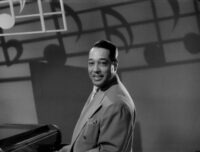Raging Bull is far from an easy film to watch. The interactions between men are flooded with toxic masculinity. Homophobic slurs are thrown around like candy, women are viewed as sex objects, and violence is rewarded. Raging Bull is the opposite of Rocky: rather than glorifying the violence set in the ring, the movie makes it a horrifying experience, with blood spilling like gushes of water and crowds assaulting each other during matches. The world Jake LaMotta (Robert DeNiro) inhabits is an intimidating place that rewards only the toughest.
The environment Jake is surrounded by is deeply sexist and homophobic. When going out with his friends, Jake’s first wife Irma (Lori Anne Flax) calls him a “f*****t,” yelling the vile obscenities out the window to belittle LaMotta’s manhood in front of his friends and the entire neighborhood. Earlier in the film, Jake is sparring with his brother Joey (Joe Pesci). Watching the two boxing is Joey’s friend Salvy (Frank Vincent), along with a few of his pals. Quietly, Salvy characterizes the two sparring as “a couple of f*gs” to draw some laughs.
When Jake addresses a problem about his small hands to his manager and brother, Joey, he asks Joey to punch him in the face continually. He does this to prove he’s still brave enough to take a beating despite having baby hands. Because of his small hands, Jake is aware he’ll never be big enough to compete for the heavyweight championship of the world. To egg his brother on, he calls him a f****t. Once more, homophobic language is used as a weapon.
Raging Bull doesn’t mask this prejudiced attitude. It captures some men as the way they are—emotional, violent, insecure animals. As a society, most of us live peacefully with one another. However, there are those that embrace confrontation. The film’s violence is exaggerated to depict man’s thirst for blood. Whether in the boxing ring or the Copacabana, everyone in Raging Bull conflicts with each other as fights break out like on a regular occurrence.
In the ring, LaMotta surrounds himself with hatred. When the refs rob Jake of a clear victory during the movie’s opening fight with Jimmy Reeves, the crowd turns into an angry mob. They throw their popcorn and rush to the arena, trampling over an innocent woman. The organist plays the national anthem in a darkly amusing attempt to calm things down. In a biting sense of commentary, Scorsese shows that despite our patriotism, we’re a violent country that can’t hold back its aggressive nature.
Joey tells Jake to stay in the ring to defy the ref’s decision. To Jake and Joey, it’s their way of saying, “F**k the refs. I won this fight, and the people know it.” LaMotta throws his hands up in the air, tossing his boxing robe to the crowd, parading himself like a champion in the ring. By displaying defiance, Jake asserts his masculinity and is celebrated by the enraged crowd for it. The crowd cheers him on, chanting LaMotta’s name.
Despite all its violent ugliness, Raging Bull is an aesthetically gorgeous film. The black and white in the film not only matches the 1940s to 1950s era the film takes place in but also resembles a simplistic world that Jake inhabits. In Jake’s universe, everything is black and white. Either you’re tough, or you’re a coward. If you’re too good-looking for a man, you’re known as a pretty boy, which is someone who’s attractive but weak. This is best highlighted when Jake faces off against Tony Janiro. Leading up to the Janiro fight, Jake’s wife Vicky (Cathy Moriarty) makes a forgetful side comment about Janiro being good-looking, which sparks a whirlwind of jealousy for Jake, who is determined to show Tony Janiro how a real man fights.
During the Janiro fight, the crowd cheers Jake when he should be pulled away from Janiro to save his life. Despite the unnecessary abuse, the crowd loves Jake’s tenacity. Jake pummels Janiro’s face beyond recognition. At the end of the fight, Mobster Tommy Como (Nicholas Colasanto) says to the guy sitting next to him, “he ain’t pretty no more.”
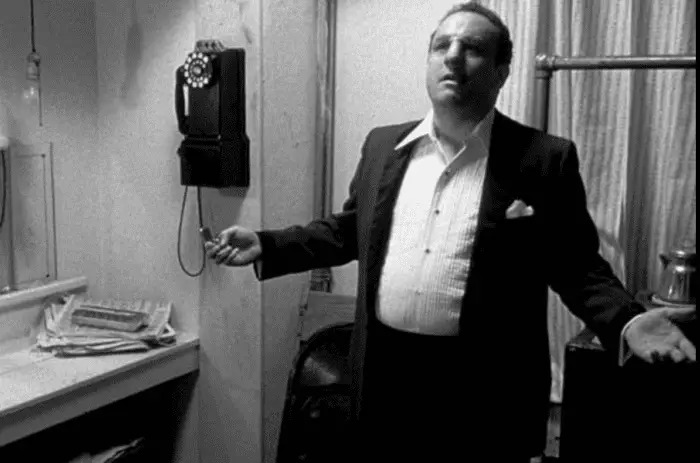
The ring itself brings a hellish landscape to the fights. For his cruelty to others, Jake’s a condemned man whose cage is the ring. As Jake says at the beginning of the film when trying to recite his lines for a public presentation, “Though I’m no Olivia, but if he fought Sugar Ray, he would say that the thing ain’t the ring, it’s the play. So give me a stage where this bull here can rage, and though I can fight, I would much rather hear myself recite; that’s entertainment.”
After delivering the line, the movie cuts to a still shot of a younger LaMotta in the ring during the Jimmy Reaves fight. When the still cuts into motion, Jake takes a few punches to the face, but he gives them right back. The arena is Jake’s hell. It’s where he is celebrated for unleashing his animalistic instinct on others, all while not realizing he’s abusing himself metaphorically.
The best example of the ring being a hellish landscape is during the second Sugar Ray Robinson fight in the movie. The match is filled with smoke. The sound is muted, only focusing on Sugar Ray, who breathes like a wild animal, ready to pounce on his victim. LaMotta is beaten senseless yet sacrifices himself to prove a point. No matter how much Sugar Ray racked Jake, he never got him off his feet. LaMotta hobbles to Robinson when the match ends, bragging, “You never got me down, Ray.” By letting himself get beaten so horribly, Jake asserts his toughness by not only getting defeated by a mile but also losing by being beaten to a bloody pulp yet still standing strong. Jake wants to give the bloodthirsty crowd their entertainment and subconsciously make penance for his sins.
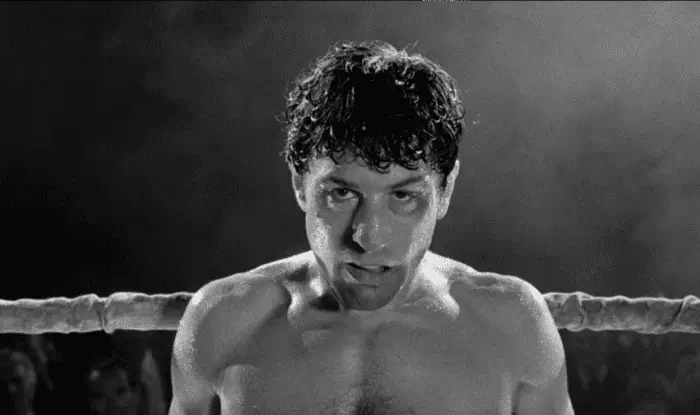
Martin Scorsese is no stranger to religious allegories. The way LaMotta is holding onto the ropes during the second Sugar Ray fight feels like a crucifixion. The shot of Jake’s arm holding on to the rope is haunting as it resembles nails planted on Christ’s hands. The imagery especially sinks in at the end of the scene, where the camera dollies to the blood on the rope.
When not being antagonized by the crowd in the ring, Jake has to act like a tough guy around his brother’s friends. When referring to the Tony Janiro fight before it’s going to happen, LaMotta jests to Tommy Como that he doesn’t know if he should “f**k him or fight him.” LaMotta goes even further to mock Salvy saying, “I can get you’s both in the ring, give you’s both a f*****g beating, and you both can f**k each other.” It’s easy to tell that Jake isn’t a fan of Salvy. Then again, Jake doesn’t like anyone other than his brother, a relationship that Jake manages to destroy, thanks to his masculine temper.
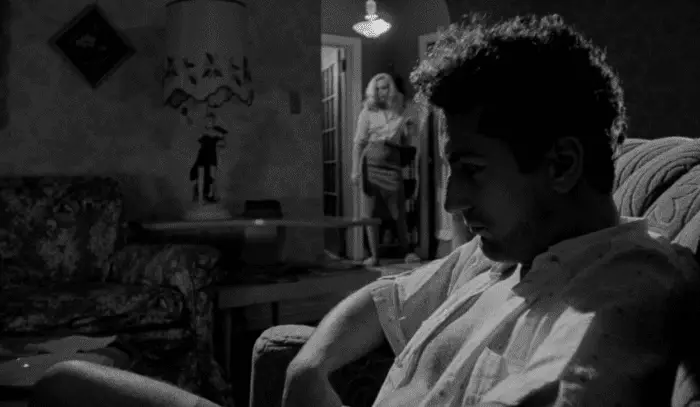
Unable to control himself, Jake soon takes his rage out on the people he loves. Suspecting his brother is sleeping with his wife, Vicky, Jake asks Joe if he slept with Vicky. Without dignifying Jake’s question with an answer, Joey leaves Jake’s house in disgust. But that doesn’t stop Jake from slapping his wife around. The reaction to the slapping is one where Vicky is used to it. She can even take it. Obviously, Jake has abused her before. Yet it escalates way out of control compared to previous off-screen events.
Jake walks down the street in his underwear, pursuing his brother. Vicky tries to stop him but can’t. The camera holds onto a long, wide shot in this sequence. It’s almost like it’s someone from another house watching the horror unfold on the street. When Jake tackles Vicky to the ground, the view of the violence is obstructed by a parked automobile. Afterward, the film cuts to the kitchen, where Jake grabs his brother in front of his family and beats him while ranting, “You fuck my wife?” While this domestic horror is happening, the radio is playing happy tunes. The score is accompanied by disturbing screeching and scratching noises.
At one point, the camera focuses on the legs of a chair Jake is holding onto as it rocks around, like how Jake was holding onto the ropes during the Sugar Ray fight. On the final note of this terrifying event, the radio skips right as Jake smacks Vicky with a closed fist. Meanwhile, we cut to Joey’s children, who’ve seen everything unfold, not knowing how to react. They possibly could be traumatized, but they don’t know it.
Given all the anger Jake used in the ring, he couldn’t help but take it from the ring to his life outside it. Through his point of view, it’s easy to see how Jake became such a monumental dirtbag. Jake’s encouraged to be angry so he can beat his opponents. Everyone around his environment is a foul-mouthed reptile who’s either a fighter or a mobster. Queens, New York, is depicted as a cesspool for machoism. One that shapes LaMotta into the monster he is. Eventually, the raging bull is imprisoned for picking up two fourteen-year-old girls from his nightclub in Florida. When locked up, Jake begins to understand how stupid his toughness is.
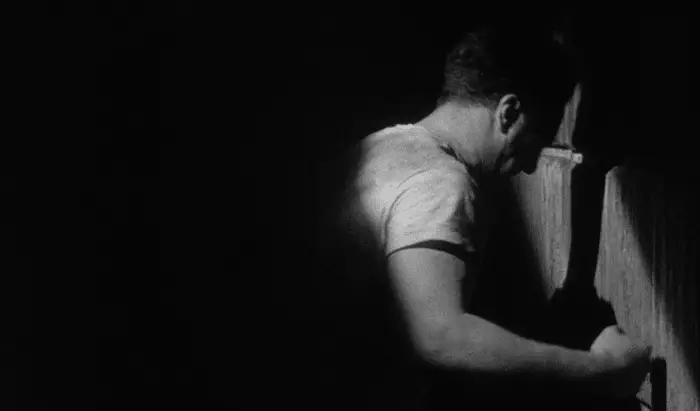
Trapped in his jail cell, LaMotta continually punches the brick wall with his bare hands. The room is pitch black, resembling LaMotta’s loss. He’s figuratively and literally in the dark. The only essence of light is a few slivers of light on the cell’s wall. LaMotta is underexposed, going to a corner after breaking his head and fists on the brick wall where he cries, claiming, “I’m not an animal. I’m not that bad.” It’s probably not until now that Jake has some idea of how the rest of the world outside of his environment is, if just barely.
Jake loses his wife, kids, and brother for being a tough guy. Eventually, Jake reconnects with his brother, but we don’t know if he does with Vicky or his kids. Raging Bull is a cautionary tale of toxic masculinity, in and out of the ring. The world of boxing is laced with hostility. Who’s to say someone else raised under LaMotta’s circumstances wouldn’t have turned out the same way? Although LaMotta’s childhood is never brought up, we get the idea that it was a macho, fight-or-flight upbringing. For being undereducated, boxing was probably the best way for LaMotta to find a living where he could leave Queens. It’s unfortunate that Jake never learned you can be a champion and a decent man at the same time.
Then again, how much masculinity is pumped into boxing, to begin with? There are the Mike Tysons and Logan Pauls on one hand. But there are also the Mohammad Ali and George Foremans of the world—fighters who inspired the best instead of the worst in boxing. Raging Bull depicts the worst in the sport, unveiling a deeply troubled masculine world told beautifully through classical music pieces and stunning black-and-white cinematography. As American spectators, we love a boxing match for its violence. We breed versions of Jake through the environment we form. If raised in a different setting, perhaps Jake would have been a different person. But America’s glorification of violent sports could have led him down the same dark path regardless.



